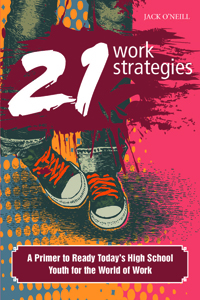Title: 21 Work Strategies: A Primer to Ready Today’s High School Youth for the World of Work
Author: Jack O’Neill
Subject: Business/Non-fiction
Release Date: Available Now
Reviewer: Maria Josey
In his book, 21 Work Strategies: A Primer to Ready Today’s High School Youth for the World of Work, Jack O’Neill takes on the often frustrating and arduous task of educating today’s teenagers on the principles and rules of the adult working-world. While there are certainly some focused, determined and dedicated high school students who are prepared for the responsibility needed to succeed “in the real world,” many other teenagers of today’s society will have difficulty transitioning from the more relaxed school environment to a strict workplace.
In a very conversational, easy-to-read and engaging “teen-speak” style, O’Neill addresses twenty-one of the most imperative lessons that a teen would need to know before entering the workforce. These lessons aren’t about office skills or technical working knowledge, but rather those kinds of adages and advice that one’s mother would offer if standing just over the shoulder. For example, “Know When To Back Off” addresses the potentially serious situations on the job when another co-worker might be close to losing their temper over a confrontation or frustrating situation. At home amongst siblings, a teen might be apt to push buttons for the sake of winning, or even for sheer entertainment! O’Neill carefully guides new workers on recognizing warning signs of a volatile situation, as well as advises them on how to back off without feeling as if they’ve thrown in the towel, or “lost.” Other lessons include topics, like: how to seek advice and feedback, learning to compromise on the job, respecting managers and other co-workers, the importance of showing up on time, the consequences of gossiping at work and many others.
The format of the book, though engaging is unconventional. The odd “imaginary” conversations between the author and the two students he mentors can be distracting, especially when the invisible students ask faux-questions that tend to rabbit-trail from the topic (“Must you Old Folks always be so long-winded? Can’t you ever get to the point ASAP?”). Still, the lessons are good ones, and many parents and managers will appreciate getting this book into the hands of high school students. In fact, I know a few working adults who could benefit from this book as well!


